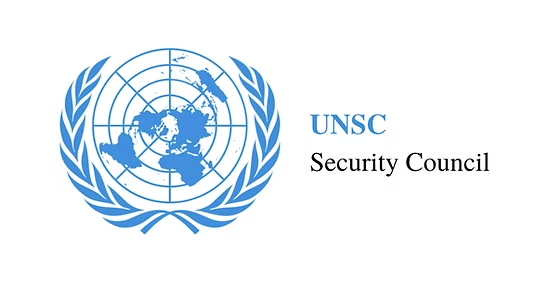UNITED NATIONS, Feb 25 (APP): The UN Security Council Monday evening adopted a U.S. resolution on the third anniversary of Russia’s military intervention in Ukraine that softens Washington’s stance on the conflict as President Donald Trump pushes for a peace deal.
Ten of the 15 Council members, including Pakistan, voted for the resolution, which omitted mention of Russian aggression, in a stunning shift from years of US policy. There was no vote against the resolution, while five Western members — Denmark, France, Greece, Slovenia, United Kingdom — abstained.
Earlier on Monday, the U.N. General Assembly rejected the U.S.-drafted resolution, which passed only after it was amended to state that the conflict was the result of a “full-scale invasion of Ukraine by the Russian Federation.”
But at the Security Council, the Western members failed in their attempt to include any reference to Russia’s invasion as their motions to seeking to amend the resolution failed to garner enough votes — exposing a sharp split in transatlantic relations.
The short US resolution mourns the loss of life in the “Russia-Ukraine conflict”, reiterates the UN’s purpose is to maintain international peace and security and peacefully settle disputes, and calls for a swift end to the conflict and a lasting peace.
Among others who supported the resolution were China and Russia.
Explaining his vote in the Security Council, Ambassador Asim Iftikhar Ahmad, the alternate permanent representative of Pakistan to the UN, said that he had voted in favour of the US resolution as it was in line with Pakistan’s clear and consistent position on the conflict in Ukraine, and its repeated calls for immediate cessation of hostilities and a negotiated settlement of the conflict.
Noting that the “priority of peace has remained largely absent and elusive”, even as the security, humanitarian and economic crises have intensified, he said: “A different approach was perhaps required.”
The Pakistani envoy therefore expressed hope that today’s resolution will “lend impetus to an inclusive peace process that yields a durable solution in accordance with international law”.
Pakistan, he said, remained deeply concerned by this tragic conflict, which has already left in its wake immense human suffering and massive damage to infrastructure, economy and the society, highlighting geo-political tensions and the economic consequences that have been particularly severe especially for developing countries.
“We, therefore, support this resolution’s general call for pacific settlement of disputes and for bringing a swift end to this conflict, in a manner that ensures lasting peace between Russia and Ukraine,” Ambassador Asim Iftikhar Ahmad said.
In this regard, he said Pakistan’s position on this, and other conflicts, is based on adherence to the principles of self-determination for peoples, respect for sovereignty and territorial integrity of states, and non-acquisition of territory by the threat or use of force.
“These principles must be respected and applied universally and consistently without any selectivity or double standards,” the Pakistani envoy said.
Referring to the efforts to bring an end to this conflict, he noted the recent high-level contacts between the leadership of the United States and the Russian Federation.
“We believe the conflict in Ukraine could have been averted through dialogue and diplomacy — It must be brought to an end now.
“Pakistan stands ready to play a constructive role to promote this endeavour in cooperation with all member states united for this purpose- the path to peace,” he added.
Before the vote, Dorothy Camille Shea, the interim chargé d’affairs representing the United States, said the U.S. “resolution puts us to the path to peace,” and after the adoption of the resolution, remarked, “Now we must use it to build a peaceful future for Ukraine, Russia and the international community.”
But Britain’s ambassador, Barbara Woodward, in explaining its opposition to the measure, said: “The terms of the peace must send a message that aggression does not pay. This is why there can be no equivalence between Russia and Ukraine in how this council refers to the war.”
The face-off at the United Nations began with a three-page resolution introduced by Ukraine in the General Assembly, demanding Russian withdrawal, calling for a “comprehensive, lasting and just peace,” and for accountability for Russia’s war crimes.
The Trump administration is reported to have tried last week to persuade Ukraine to withdraw its resolution, and when that failed the administration attempted to negotiate with European allies on a text that it would support.
But on Friday afternoon amid negotiations, the United States told its European allies that it planned instead to put forth its own resolution. Days earlier President Trump had called Volodymyr Zelensky, the Ukrainian president, a “dictator”, asserting that Ukraine had started the war.
France’s Ambassador Nicolas de Riviere noted such proposed amendments demonstrate “our resolute commitment — after three years of war — to a comprehensive, just and lasting peace in Ukraine”.
However, he underscored that peace cannot be a synonym for capitulation of the aggressed State. The amendments, he said, also aim to recall that there is an aggressor and an aggressed State, with the Russia having attacked a sovereign State that posed no threat to it.
On his part, the Russian Ambassador, Vasily Alekseyevich Nebenzya, said of today’s text: “We consider it, overall, as a common-sense initiative.”
It reflects, he said, the desire of the new United States Administration to “really contribute” towards a settlement. He also proposed several amendments, including inserting language regarding the need to “eradicate the root causes of the Ukrainian crisis”.
On the amendments proposed by the European Union members, the Russian envoy said they “replace the essence of the American text and make it into another anti-Russia ultimatum”.
None of the five proposed amendments were adopted, either because they failed to obtain the required number of votes or because the Russia cast its veto.

